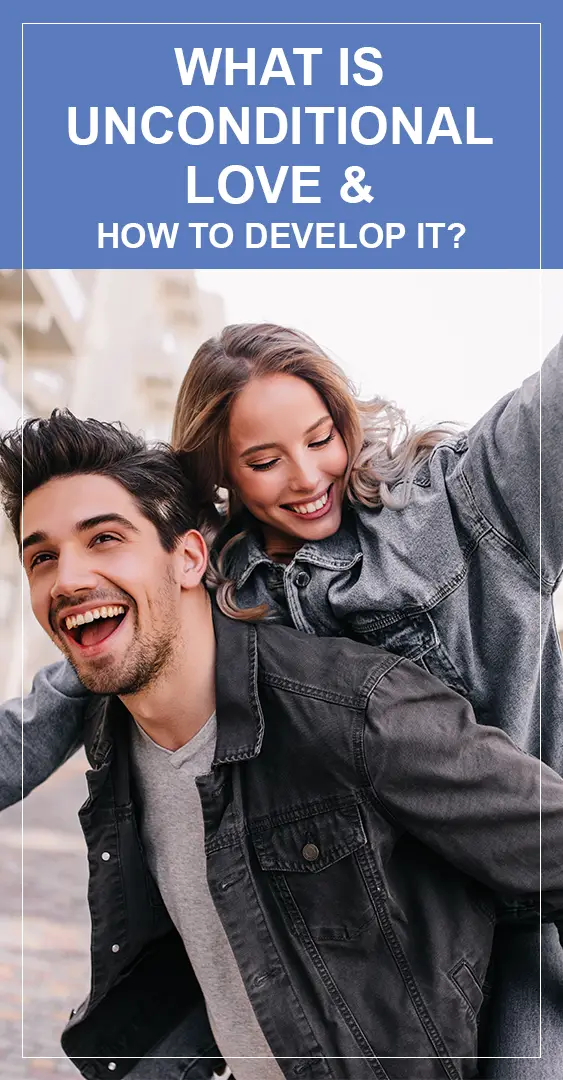
Important: This article is for informational purposes only. Please read our full disclaimer for more details.
“Love is not about possession. Love is about appreciation.” – Osho
To love and be loved is the most powerful experience in life. Love is designed to feel good. What many don’t realize is that love is a verb – it is what we do, not just how we feel. Therefore, understanding how to love, how to convey love, and receive love is an essential life skill for all of us.
A healthy, long-term relationship thrives on unconditional love. What is unconditional love, is it possible to love someone unconditionally and how to do that? That’s what we plan to discuss in this post.
What Is Unconditional Love?
Unconditional love is the art of loving someone just as they are, without judgment or an expectation for something in return. When you love your partner as they are, you love them unconditionally.
In unconditional love, you do not look for reasons to love. You meet the person where they are, exactly as they are, and without requirements or efforts to change them. Even in difficult times, your fondness for them does not change.
Examples Of Unconditional Love
These examples illustrate how unconditional love is expressed:
1. Your partner has lost his job and is unable to support you financially. The burden of taking care of the family’s financial responsibilities is entirely on you, at least until he begins earning again. You express support and concern for your partner’s job loss, encourage his spirits and celebrate the gifts he offers you and your life, despite the temporary loss of employment.
2. You had a fight with your partner and he was harsh to you. After a brief time, he apologized. You accept the apology, and look for ways you may have contributed to the conflict or disagreement. Without blaming one another, you look for a deeper understanding about what transpired. This shows unconditional love for each other.
3. After sacrificing her career for three years to take care of kids, your partner wants to return to work. . That means some additional responsibilities for you at home. You encourage her to follow her dreams, and discuss ways you can share the burden of the household work.
4. Your partner is facing a tough situation at work and is not able to perform her usual family duties. Rather than complain, you help out, do more, and express concern for her well-being.
Unconditional love is not the same as people-pleasing. To love someone conditionally is a gift that you offer with the expectation of nothing in return. People-pleasing, however, is the process of behaving in loving ways so that you can ensure their love in return. There is an expectation that by being loving, you will secure their love in return, which helps reduce one’s fear of being unlovable or abandonded. If your partner is taking you for granted, this is a form of disrespect and you are not setting healthy boundaries that communicate your desire for respect and appreciation. By responding to this behavior with efforts to please will add to your feelings of unloveability rather than strengthen your feeling of being loved.
Is Unconditional Love Possible?
Yes, unconditional love is possible. But for your partner to love you unconditionally, you need to love yourself and accept all your flaws.
- If you can accept your flaws, then you can expect and also appreciate that your partner’s love is unconditional.
- On the other hand, if you are not aware of your shortcomings and expect your partner to love you unconditionally then that is selfish love. We cannot receive what we do not believe.
- Holding on to your shortcomings and assuming your partner to accept you can be destructive. For example, if you are abusive toward your partner or having affairs, you cannot expect your partner to accept and love you unconditionally.
Also, unconditional love is a give and take. If you want your partner to love you unconditionally, then you should love them unconditionally.
- For example, you have the habit of shutting down the love and affection towards your partner when they do not do things your way. Put yourself in their place, and think if you can give unconditional love in such a situation. No, because unconditional love is a give-and-take.
Loving someone unconditionally involves generosity and kindness, as well as a desire to understand one another and respond to one another’s needs for love, acceptance and understanding.
Signs Of Unconditional Love
How can you tell if your partner loves you unconditionally? Here are the seven signs of unconditional love.
1. You can trust them with your secrets. If there is one person in this whole world whom you can trust your secrets with, it is your partner. Be it your darkest secrets or things you are embarrassed about, you are comfortable to tell anything to your partner because you feel a deep sense of acceptance, and you feel confident that their love for you will not change when they learn new information about you.
2. You fight, you make up: We cannot avoid fights in a relationship. But when there is unconditional love, the desire to understand each other supercededs the desire to be right or to win the fight. there is an understanding that arguments are temporary; love is permanent.
3. As you change and grow, so does your love: If you are married for a decade, and your spouse still makes you feel loved, then such love is unconditional. It does not depend on how you look, how you behave, or how much you earn; they love you for who you are and nothing can change that, not even time.
4. You are secure: Both partners have a feeling of trust and security that the other has their back. There is no room for doubt, or insecurity when time is spent apart.. Partner’s encourage one another to spend time with friends, parents, and engaging in hobbies and interests. They give you the assurance that you can have your time without feeling that they have been left out.
5. They have long-term plans with you: When your partner has unconditional love for you, they give you the status of the life partner and plan their future with you. When you dream about the future, the dreams are about both of you.
6. You are open and honest: If your partner loves you unconditionally, they do not criticize you for your flaws but give you constructive feedback and help you correct them. And you are glad to make the changes as you know your partner is worth all the effort.
7. You are one another’s cheerleader: You need not go to the moon and back to impress them; even small things like preparing a special dish will make your partner proud of you. You recognize one another’s fforts and express gratitude for one another.
You can understand unconditional love better if you could compare it with conditional love.
Conditional Vs. Unconditional love
Conditional love
- It does not look for anything in return. You love your partner with all your heart
- In unconditional love, you do not try to change your partner to fit your imagination.
- You respect your partner’s beliefs and opinions and still continue to love them.
- Your love for your partner is not subjective. You do not expect your partner to make your life easy. Instead, you try to include them and work as a team.
- When you start loving unconditionally, you no longer worry about petty things in the relationship.
Unconditional love
- Conditional love is like a business. You invest in a person as long as they are beneficial to you.
- You point out flaws, accuse them of being the odd one out and insist that they act as per your conditions.
- When your partner deviates from your expectations, you transform your love to hatred.
- In conditional love, you look for a partner who can make your life easy and comfortable without making any efforts to earn it.
- Thoughts such as “my partner did not compliment me, and so I will not compliment them either” will fill your mind with unnecessary negative emotions.
How To Love Unconditionally?
“It takes two flints to make a fire.”
Here are some ways to show unconditional love to your partner.
1. Let your partner in: To love and be loved, you must be known and understood. This requires curiosity, interest, vulnerability and sharing. Let your partner in. When you allow your partner inside your inner world, and you trust that you will be safe.
2. Give and receive: It is not enough if your partner loves you unconditionally. To keep the spark alive you must meet them with the same loving behaviors. Though unconditional love is the process of loving without expectation, it is essential to nurture this same love in return for an unconditionally loving relationship.
3. Offer acceptance: Judgement and love cannot exist together. When you judge a person, you are expecting them to behave as per your rules, which is against unconditional love. If you really want to love your partner unconditionally, then start by not judging them.
4. Be generous: Do not wait for your partner to show unconditional love. You take the first step towards loving them unconditionally.
5. Words of affirmation: Communication is the key to unconditional love. Express your appreciation to your partner regularly. This does not require expensive gifts or fancy dates pay attention to how they feel loved, and speak their language whenever possible. Express kindness. Such actions will create a lasting impression in your partner’s heart.
Unconditional love must come from within. You cannot pretend to have it but inculcate it through practice. Begin with an open mind, and control your urge to criticize your partner for petty flaws. That will be the first step towards loving your partner unconditionally.
Do you have an unconditional love relationship with your partner? Share your story with us in the comments section below.
You Might Also Like:
- 250+ Funny & Romantic Questions to Ask Your Boyfriend
- 101 Positive Affirmations For Self Love And Acceptance
- 6 Key Differences Between Being In Love & Loving Someone
- Obsessive Love Disorder: Signs, Causes and How To Deal With It
- 45 Best ‘I Love You’ Poems For Lover
- What Is Unrequited Love? 9 Signs And Ways To Cope With It
- 20 Main Differences Between Love And Lust
Image Credit: freepik
















